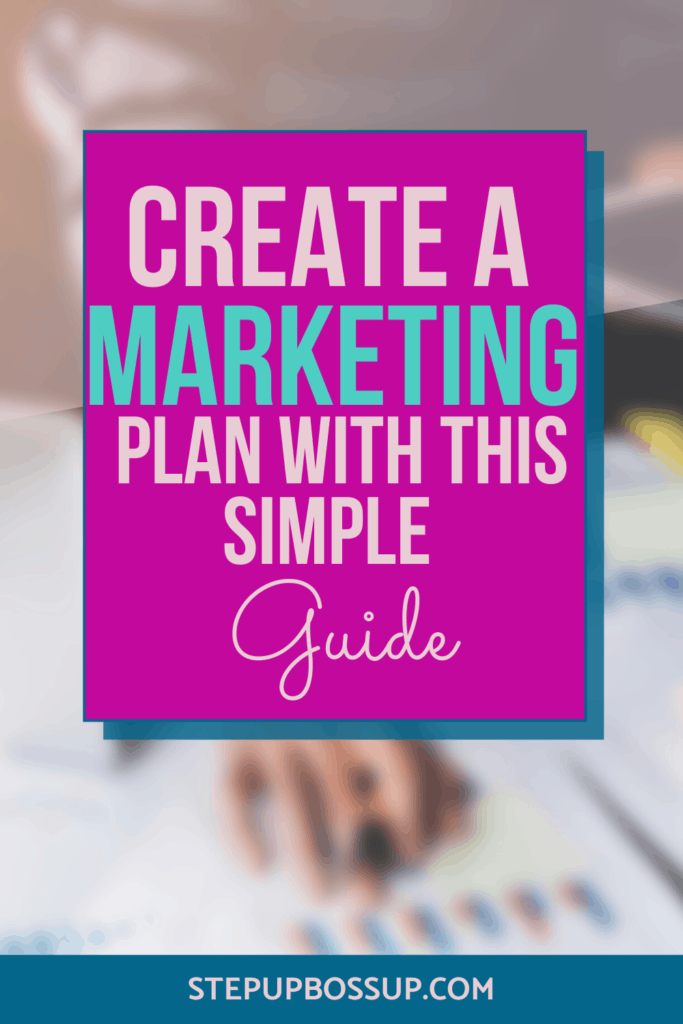Sharing is caring!
Do you have a new business? Are you wondering how to market it? The best way is to create a marketing plan. In this blog post, we’ll talk about how to create a marketing plan for your business that gets you clients, what goes into the plan and tips on creating one.
A marketing plan is crucial for every business but especially a new business. It will help you plan how you will get in front of your ideal customers to build your audience, get clients and make sales.
So if you have no clue how to create a marketing plan, this post is for you!
What is a Marketing Plan?
A marketing plan is a document that details the steps your business will take to market your products and services to create awareness and to increase sales.
It outlines how you’ll attract new customers, maintain relationships with existing clients, and make use of current technology in order to reach more potential buyers.
For instance, you may decide that you want to create Youtube videos to build awareness and attract new customers to your business, then use Instagram to build awareness and develop your community and Pinterest to drive traffic directly to both your website and YouTube channel.
This would be part of your marketing strategy that you would write out in detail within your plan.
Typically, a marketing plan includes:
- Overall Business goals
- Marketing specific goals
- Ideal Target Audience and Client
- Marketing tactics for each platform you plan to use
- Budget for tools, resources and ad spend
- Timeline for when marketing strategies will be implemented
- Key Performance Indicators so you know how you’ll measure success
A marketing plan is the foundation of your business’s strategy. It defines what messages are sent to potential customers and how they’re communicated, ideally creating awareness about your business while showcasing your products and services in a way that engages your target audience.

What Should Be in a Marketing Plan?
There are six key areas that should be included in your marketing plan:
1: Goals
Every business needs to have goals. And they need the right ones for their type of businesses growth and success.
It’s important to know what the different types of goals are and how they’re measured as well as why they matter for a business!
In your marketing plan, you’ll usually be focused on two sets of goals. These goals are the ones that support business goals like sales or growth.
- First, there are revenue-based goals which means something along the lines of “increase annual net income by 10%.”
- The second type of goal might focus on getting more potential clients – so it could go something like “Grow monthly email subscribers from 200 people per month to 400 people per month”.
This section of the marketing plan defines what these goals are and how they will be met.
2: Audience
It’s important to define your target audience and ideal client. Your marketing plan will be designed with this specific person in mind, which can help ensure that you are targeting the appropriate individuals who would find value in what you’re offering.
If there is more than one group of people that could benefit from your product or service, then it may make sense to create different sections within the plan for each individual segment (e.g., families vs couples).
However, if this is a new business, start by defining just one target audience and determine how they identify themselves as your “ideal customer”. You can always expand on these ideas once things have gotten off the ground!
3: Marketing Strategies & Tactics
This section helps you think about how to plan out your marketing strategy.
You’ll start by defining what platforms you’ll use to promote your business, products and services. Then whether you’ll be using paid or free strategies.
For example, will you only use Instagram and Youtube and no paid ads or will you use Instagram and YouTube but also spend money on Influencer marketing as well as Instagram ads.
After you’ve decided on your marketing strategy it’s time to put in some individual tactics that support the strategies that will be implemented on each platform.
4: Advertising
This section is crucial if you plan on doing paid ads as it will help you to find the best strategy before you spend any money in order for your business to succeed.
In this section, you will plan for your ads and what resources you’ll need. You’ll also get the chance to set budgets in order to know what they might cost before making a commitment or spending money unknowingly!
Questions to ask:
- How do I create good ad campaigns?
- What should my budget be?
- Where can I find great images/video clips, etc.?
5: Budget
Before you can market your product or service effectively it’s important to know what resources are available and how much time and money you have.
For instance, if you’re just starting out and have one main offer with a freebie attached and only plan on using Facebook groups to build your email list and make initial sales then you can do it all yourself. However, if you’re on your third launch and plan on creating a more complex sales funnel with advertising then you may need additional funds for advertising, maybe a copywriter or a virtual assistant.
6: KPI’S (Key Performance Indicators) & Timeline
A timeline is necessary for any marketing plan. It’s a good idea to know when each part of the process should be completed and by whom, plus it helps with measuring success.
KPIs will let you know how you will measure the success of your marketing. To decide on which KPIs to use, ask yourself what numbers do I need to review so that I can tell if my strategy is working or not?
You will want to measure the following:
- awareness-building strategies for your products and services,
- engagement strategies with your audience,
- tracking how many people started your sales funnel but didn’t complete the buying process etc.
Determine what numbers you need to know each month or at different points in time for measurement purposes and how often these will be reviewed.
Why create a marketing plan?
Creating a marketing plan will provide you with many benefits including the following:
- A clear and accurate understanding of your scope, objectives, strategies, budgeting needs and critical success factors for your business.
- Establish standards by creating templates to help create consistency in content creation (i.e., blog posts or social media updates) so that what is created stays on brand across all channels without confusion; ensure updates are made at set times during the week or month as well as understand when these should be shared via which channel(s).
- Create a team who shares goals through consistent communication about campaigns from start-to-finish because they’re aware of everything happening within them such as deadlines and costs associated with promotions/ads etc.; So when you’re ready to build your team they will be onboard straight away.
How to implement your marketing plan
Once you’ve created your marketing plan, it’s important to get the ball rolling. To do this, create a set of achievable goals that can be completed in one month as well as an accompanying tasks list with smaller action items needed for success.
The last phase is actually executing what was planned out!
When should the plan be reviewed?
You should review your marketing plan often to see if any of your strategies are working. For example, you can create a monthly recap in which you document what changes were made and how they impacted conversions (or other tactics).
Re-examine your marketing plan after any major event has taken place to see whether or not it’s had an impact. You should also review what could be done better in the future, for example creating quarterly updates on how well new services are progressing in line with the strategies you’ve implemented.
And remember there will always be room for improvement and growth.
How to Create a Marketing Plan That Gets Results
Marketing is an important step to get your business moving. First, you need a plan and that needs to be achievable for it to work well. Next comes goals with very concrete tasks listed so there’s no confusion on what has been accomplished as far as marketing goes.
The last phase is execution which can sometimes prove difficult (cause sometimes taking action can be the hardest step) but if done correctly and consistently will give you amazing results, no matter what!
Your marketing plan will help you create consistency within your business by establishing standards for your marketing message, what kind of content to publish and the frequency with which it should be updated.
You’ll gain the most results by including these six key areas when creating your marketing strategy:
- goals (i.e., how many people do want coming through their doors?),
- Marketing Strategies & Tactics (how you’ll use each platform to meet goals),
- audience( i.e., who are they looking at),
- advertising (where does it happen? – Google Adwords?),
- budgets ($1-200 per day),
- KPI’s/timelines (when will things be done and how will you measure success).
Your Marketing Plan needs to be reviewed monthly so changes and improvements are made accordingly – every month is an opportunity!
Time to Create Your Marketing Plan
You’ve created something amazing and now you need to get the word out. That is where marketing comes in!
Marketing helps you connect with potential buyers who are looking for what you offer just when they need it most.
A marketing plan is a document that details how your business will promote its products or services so as to achieve certain goals (such as increased sales). It should also include information about your target audience, messaging strategy, branding strategy, marketing channels, and more.
With these tips, I hope you’ll be able to create an effective marketing plan for your small business today!
If you want help getting started with this process get FREE Acess to The Build Your Business Vault to get our FREE Marketing Plan Template below!



